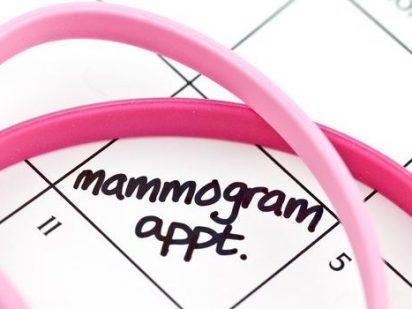When is a good time to get a mammogram?
When you are 40? Or is it 50? And what if you have a family history?
Earlier this year, The American College of Physicians (ACP) issued new breast cancer screening guidelines for average-risk women under the age of 50 with no symptoms of breast cancer. The recommendations, which were printed in the Annals of Internal Medicine in April, said that at the age of 40, women should speak with their primary healthcare provider about the benefits, harms, and personal preferences of screenings. Mammogram screenings should otherwise start at the age of 50 and annually up to the age of 74.
The ACP noted that women at a higher risk of breast cancer or anyone with prior abnormal screening results should get screened before the age of 50.
However, the American College of Radiology (ACR) and Society of Breast Imaging (SBI) disagree, saying in a statement that these recommendations “may result in up to 10,000 additional, and unnecessary, breast cancer deaths in the United States each year.” The recommendations could also likely result in “thousands more women enduring extensive surgery, mastectomies, and chemotherapy for advanced cancers.”
“It seems like when you just get it figured out how often you need to return for a mammogram or a pap smear, they go ahead and change the rules,” said Heidi Grondahl, WHNP, a member of the Family Medicine team at Trinity Community Clinic – Western Dakota, in Williston. “Nowhere is this more prevalent than in screening guidelines; and there are many – one for each body part, it seems.” The decision on when to get a mammogram should be made following a discussion between the patient and their healthcare provider, she said, adding that the need for a mammogram is somewhat individualized. “While we have guidelines, there are personal factors that we must consider as well in deciding when to start, finish, and how often we are doing screening.”
At the same time, she understands the concern about getting a mammogram too early because “you can over-intervene, and that can be harmful.” Mammograms may be harder to read if you are pre-menopausal, as breast tissue tends to be far denser, “and the tests aren’t as accurate,” she added.
According to the Centers for Disease Control and Prevention (CDC), screenings carry the risk of false positive tests, which can lead to more tests, thus more of an expense, not to mention the invasiveness, time, and/or anxiety. With the balance of the harm versus the help of frequent mammograms, the topic “becomes more an of emotional argument,” Grondahl said.
However, certain risk factors – having a significant family history of certain cancers (breast and ovarian) – would understandably lead to a person getting screened earlier. Overall, Grondahl suggested seeing your provider for a yearly health maintenance exam. “This is the best time to talk about the screenings you are due for and it is one exam that most insurances pay in full, without additional cost to you.”
To schedule a mammogram, please call Trinity Health’s Breast Imaging Center scheduling line at 701-857-2640; for mammogram services at Trinity Community Clinic – Western Dakota, in Williston, call 701-774-0810. Referrals are not needed for mammograms.

